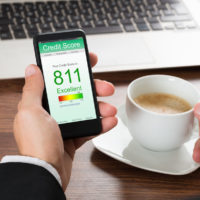How Long Must Bankruptcy Stay On Your Credit Report in California?

Bankruptcy is an important and viable option for many Americans struggling with debt. Clients often fear that bankruptcy means the end of their financial lives. At some point down the line after recovering financially, you may need a loan for a car or home, or even to rent an apartment with a landlord who checks credit scores. Bankruptcy discharge will, unfortunately, appear on your credit report for years after the discharge. The good news is that bankruptcy does not stay on your credit report forever, and there are steps to take to ensure your credit starts to improve as soon as the bankruptcy is completed. The amount of time your bankruptcy will stay on your report depends on the type of bankruptcy.
Chapter 7 bankruptcy
Generally speaking, in a Chapter 7 bankruptcy, your assets will be liquidated and used to pay your creditors, and all qualifying debt will be completely wiped away. There are certain types of debts that do not qualify for Chapter 7 discharge, and there are ways to protect certain assets from liquidation. By working with an experienced California bankruptcy attorney, you may be able to exempt all your assets from liquidation and file your bankruptcy as a “no asset” case. You are discharged once the liquidation process has been completed and the proceeds (if any) have been distributed among your creditors.
The Chapter 7 bankruptcy discharge will generally remain on your credit report for 10 years as a “derogatory mark.” In addition, the discharged debts are likely to be listed on your report as “included in bankruptcy” or “discharged” with a balance of $0. These accounts should disappear from your report after seven years from the date you filed, unless the accounts were already delinquent at the time you filed. If they were already delinquent, then they may fall off seven years from the original delinquency date. On the positive side, these accounts will no longer be listed as “unpaid” or “past due,” which can be a relief to many debtors.
Chapter 13 Bankruptcy
Chapter 13 bankruptcies involve creating a repayment plan to pay your creditors back over a period of time either all or a certain portion of their debt. The time period is typically three or five years. Once the Chapter 13 bankruptcy plan is completed, the qualifying debt will be discharged. At that point, the discharge will remain on your credit report for seven years. As with a chapter 7 bankruptcy, the individual accounts may be removed from your report sooner if the accounts were already delinquent at the time you filed.
You Can Take Steps to Improve Your Credit over Time, Even Before the Discharge Disappears
Even though the bankruptcy discharge will stay on your credit report for 7 or 10 years, the effect of the bankruptcy on your credit score will diminish over time. If you keep yourself financially responsible following the bankruptcy, you should see your credit score improve. In addition, many lenders will work with you even after a bankruptcy based on such factors as current income, current assets, co-signer credit and the fact that your bankruptcy has eliminated debt.
After filing for bankruptcy, check your credit report for errors. Make sure that only the accounts included in the bankruptcy are listed as “discharged” or “included in bankruptcy.” It will likely take two or three months after the applicable time period is up for these accounts to be properly updated on your report; the same goes for when they should be removed from the report. If you know that an account was delinquent prior to filing for bankruptcy, make sure that the account falls off at the appropriate time (seven years from delinquency). Make sure that the other negative marks are removed after the appropriate time period. If there are mistakes, notify the credit bureaus and dispute the errors. A qualified debt relief attorney can help you correct these errors.
You can also take steps to build your credit back up by, for example, getting a secured credit card. If you make all of your payments to the secured card in full and on time, and keep your credit utilization rate low (i.e., not maxing out the card regularly), your credit will improve.
Talk to an Experienced Southern California Bankruptcy Attorney
If you or your company are struggling with debt and considering bankruptcy, please contact Rounds & Sutter for a free consultation. With offices in Ventura, Santa Barbara, and Westlake Village, we represent clients throughout Southern California, offering smart, compassionate legal counsel in the face of life’s challenges.